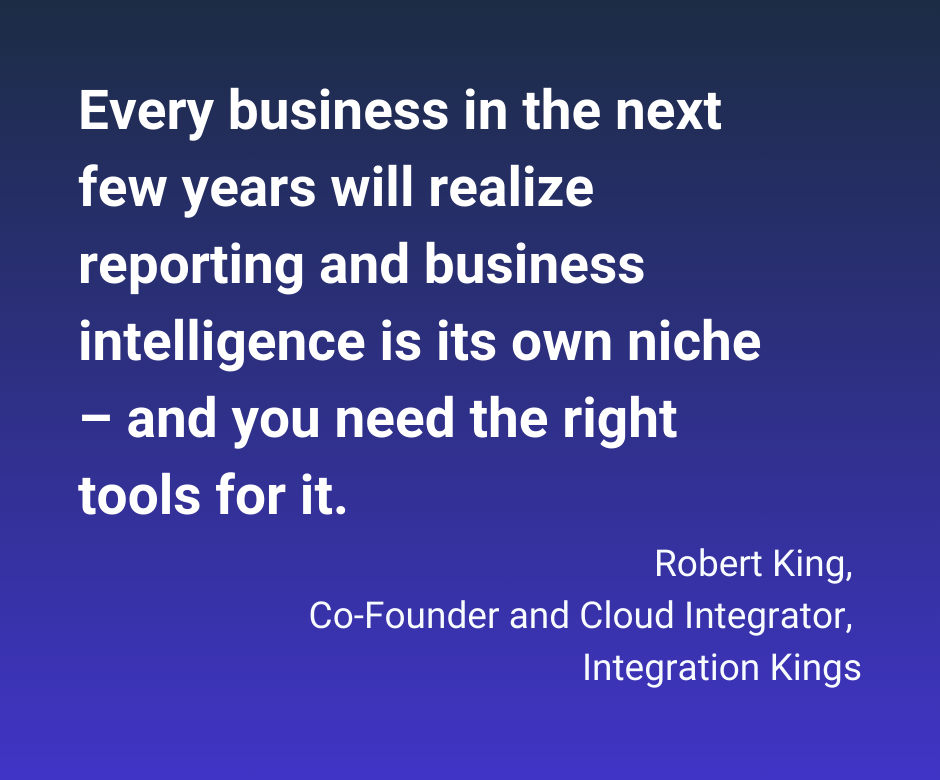
It all started in 1999, when Big Spoon’s peanut butter-loving co-founder Mark Overbay was living in a rural farming community in Zimbabwe as a Peace Corps Volunteer. There, he saw community members roast and pound peanuts into a thick paste that they’d add to their savory dishes. Wanting to replicate that uniquely fresh, small-batch approach to peanut butter at home with fresh ingredients, craft and care, he started Big Spoon Roasters in 2010 with his wife Megan.
With their fresh-roasted, hand-crafted nut butters and snack bars, Big Spoon is a North Carolina success story. Their mission is to build healthier relationships with our planet through delicious, nutritious foods made without compromise – and the foundation of that are their moreish bars, jams and nut butters. And while their growth has largely been organic, their piecemeal systems were getting in the way of their ambitions.
Since engaging Integration Kings to implement a new ERP system of systems, they’ve experienced double-digit growth during a global downturn. It’s a testament to their great products, the right strategy, and a great collaboration with Integration Kings.

Bread and coffee have had their craft movements, but it’s taken a bit longer for nut butters to go from PB&J staple to a space for serious culinary innovation. But Mark and Megan have shown that it can be done.
They first started making gluten-free, dairy-free, soy-free energy bars for Megan to eat while training for triathlons, but soon saw that there was a big market for freshly made, responsibly sourced nut foods with a focus on sustainability and purposeful nutrition.
Values drive Big Spoon. “We’re a small business, and every decision we’ve made has been very purposeful and slow,” Megan says. “Everything from the cleaning products we use to the living wages we pay is based around our values. But that’s also meant all our growth has been organic, too; we haven’t taken outside money, because that can sometimes mean making compromises. Every investment we’ve made has been really intentional and thoughtful, because we’re doing this for the right reasons.”
The only place this intentionality wasn’t apparent was in their systems. When Megan started working full-time on Big Spoon in 2020, she quickly realized that while they were capturing the right information, their operational organization was lacking.
“All the systems were all cobbled together.” Megan explains. “And they weren’t talking to each other. There wasn’t a lot of cohesion, and it would take me hours to pull together the different reports that I needed.”

That’s a serious problem with a manufacturing and production company that needs to know exactly what’s on order, their inventory status, how fresh each product is, and how they’re going to get it out to the right customers. With so much time taken up on unclear data and reporting, Big Spoon’s ambitions were stuck.
It was time to get rid of the old and stir up a fresh blend.
Early in her career, Megan was an ERP expert, even implementing SAP for a massive safety razor company. Big Spoon had similarly big ambitions, but she knew that it would be harder to justify the cost and effort implementing an enterprise-level software solution for this small-to-medium sized business right now.
Other established small and medium businesses she spoke to agreed.
“We heard from a lot of people that they hated their ERPs, and they’d spent a hundred grand trying to implement it and it all went down the toilet – it was terrifying. An ERP would be overkill – and frankly, not really well suited for the scale of our business.”

Fortunately, there was another solution. A local distributor connected Megan with Robert King, a cloud systems integration specialist at Integration Kings, to look at all aspects of Big Spoon and implement processes and cloud-based systems that work harmoniously.
Robert has an extensive background in consulting and accounting, where having a strategic plan has been integral to doing great work. The first point was to analyze the business together. Only once they Megan and Robert together understood where Big Spoon was going, what was needed, what was legacy and what needed to be transitioned off could they start to think about how to approach change.
“Why you’re building a business, where you’re going, how you’re getting there and the KPIs that tell you you’re on the right track – these make the foundation of a solid integration plan,” says Robert.
Once there was a good understanding of Big Spoon’s needs, growth strategy and future ambitions, the solution was clear: a “system of systems” that would allow each part of Big Spoon to talk to each other well. And as they grew, the ecosystem would grow too, so they wouldn’t have to do another system overhaul two or three years down the line.
The “systems of systems” approach often gets overlooked for the sake of flashier ERPs, but for those small-to-medium sized businesses who need a dynamic solution, this ‘ecosystem’ approach can be invaluable. And it’s precisely this approach that’s championed by Coachbar’s ecosystem of software consultants and coaches.
For Big Spoon, that meant a key inventory management software as the backbone, with integrations that would allow for features like reporting, demand planning, and integrating with timeclock, payroll, expense processing, and accounting systems, all utilizing open APIs so the integrations could evolve as needed and different systems could talk to one another.
With a robust roadmap through design and dependencies to success planned, Robert and Megan could focus on implementing the highest priority items, knowing that future pieces could be added as Big Spoon’s demands continue to grow.
Robert built a “living system” to the side of the existing business systems to avoid any legacy messes. After much testing and training, they went live with a comprehensive software stack: using Dext for financial management, Xero for bookkeeping, Deputy for timekeeping, Gusto for payroll built, and ShipStation for ecommerce fulfillment with a Faire integration added in – all resting on a foundation of Cin7 Core.
And, as Megan adds, the whole package wasn’t going to be a financial deal-breaker, either.

“We were spending a good bit of money on systems that weren’t working for us. Robert’s suite was so minimally more expensive it was almost laughable. Even though we were looking at putting in more systems than before, it wasn’t as if we were paying for more systems. The math worked for us. It really was a no-brainer.”
In terms of impact, Megan has been able to see the difference in every jar and order. Not only have they scaled up from a dozen employees to now 20, but their revenue and reach has scaled at a much faster rate. Plus they’ve been able to repurpose existing team members to more meaningful work, rather than having to hire more people just to manage the system. That alone saves her an FTE, at least $50,000 (USD) a year, Megan estimates.
“We’re now earning around $200,000 more each year because we better understand our business data and revenue,” says Megan. “Plus around $100,000 because of the time we’ve saved, reduced duplicate processes, and can access data from anywhere. We’ve also brought payroll and bookkeeping back in house, which actually saves us money due to the lower effort it takes, and deeper knowledge we have.”
“Just recently, we got a huge order from a grocer in the US. It’s a new customer to us, and they want one case each of six of our nut butters in each of their 380 stores.
“I used to spend hours trying to reconcile the value of our inventory between our old inventory system and QuickBooks Online, and now that is seamless between Cin7 and Xero. The Faire integration with DEAR has saved us hours per day. Deputy to Gusto saves hours for each biweekly payroll. That’s just a few of the changes, but it adds up to a big impact on our staffing and our growth.”

Megan and Robert are still working on Big Spoon’s systems, but it is, they say, like being an accomplished bodybuilder in ‘maintenance mode’, keeping the systems in good health – with occasional help from a personal trainer.
“There’s certain things where I think I’m pretty good and functioning the system,” says Megan. “But if there’s anything I’m uncertain about, I’ll just ping Robert and Integration Kings. The turnaround time is spectacular. And there’s a lot of us thinking about what the decisions would be around that. So Integration Kings continue to be both advisors and tech support for the systems that we’re on.”
Robert’s quick to point out that great projects like this can only happen when there’s good communication. “We want them to feel they can reach out and say, ‘Hey, this is a bugbear.’ We’re in a different country and a different time zone – we only work well if there’s good, open communication. We speak our mind to each other, and we don’t feel afraid to do that.”
In fact, being worlds apart – with Integration Kings and Big Spoon in Australia and North Carolina respectively – has worked to everyone’s advantage. In addition to the complementary time zones (that mean changes can be delivered overnight), the Australasian approach to business has been a real boon.
“I think some people would be afraid of working with an Australian or New Zealand company because of the time zones,” says Megan. “But the US software business is very focused on bigger companies; Australia and New Zealand are doing more innovative, small-to-medium sized business technology work. The better stuff is there! So why wouldn’t I want to work with somebody who knows our kind of business best?”
The feeling is mutual. For Integration Kings, Megan’s candidness and willingness to execute an ambitious project has made her an ideal client. Robert says, “I think Megan’s done a terrific job, and Big Spoon is better for her capability.”
The only thing that could be different? More Big Spoon products in Australia. But at the rate that Megan’s growing the business, that could be sooner than you think.








Founder & COO,
Big Spoon Roasters

Co-Founder and Cloud Integration,
Integration Kings
Visit our directory of software consultants in the StackPlan Consultant Directory. Vetted consultants are ready to support your business needs.

Your business runs on technology. So why don't you have a clear plan for what you need, and how it will all work together? Get started with a tech roadmap and put your technology to work.
Subscribe to our newsletter to get latest updates.
We use cookies to personalize content and ads, to provide social media features, and to analyze our traffic. We also share information about your use of our site with our social media, advertising, and analytics partners.